EU Blue Card: requirements and registration procedure in 2025
Table of contents
- What does the blue card allow?
- Why is the Blue Card more accessible in 2025?
- Which European countries issue a blue card?
- In which European countries can you not get a blue card?
- Requirements for employees when applying for a Blue Card in 2025
- Mobility within the EU for Blue Card holders in 2025
- List of documents for obtaining a blue card
- How to apply for a blue card?
- Issuance of a blue card: a detailed checklist
- EU Blue Card validity period
- Who can be refused a blue card?
- Is it possible to get a permanent residence permit on the basis of a blue card?
- How can a Blue Card holder change jobs in 2025?

EU Blue Card – a residence and work permit for highly qualified specialists in the European Union countries. In 2025, the EU announced significant changes to the EU Blue Card program, aimed at simplifying employment and life for highly qualified specialists from all over the world. Find out what benefits the card provides, which countries issue it, the requirements that must be met to obtain a permit, as well as the package of documents for obtaining a permit
The EU Blue Card is a residence and work permit in one of the European countries for highly qualified workers. It can be issued by citizens of states that are not members of the union. The card makes the procedure of employment in Europe much easier for specialists.
We have collected all the useful information about the EU Blue Card, changes in legislation, and the features of its registration in 2025 in this article.
Planning a trip abroad? Choose a reliable health insurance policy on the Visit World portal.
What does the blue card allow?
On the basis of a blue card, a foreigner can enter the EU (including re-entry), stay and work in the country that issued it, as well as move freely through the states of the Union. The advantage is that it is allowed to move together with the family.
Also, the holder of a blue card receives all the rights, like a citizen of the country of residence. However, work is allowed only in the field in which the permit was issued.
All benefits, except for housing, loans and grants, are provided to EU Blue Card holders (medical assistance, right to education, social support, etc.).
EU Blue Card holders are allowed to travel to their home countries or other non-EU countries for a maximum of 12 consecutive months without losing their right to an EU Blue Card.
Why is the Blue Card more accessible in 2025?
The changes planned for 2025 are aimed at simplifying the conditions for obtaining this status. Lowering salary requirements, reducing mandatory contract conditions and the possibility of taking into account professional experience instead of a diploma make the program more accessible. The European Union demonstrates openness to attracting qualified specialists from around the world.
Which European countries issue a blue card?
The blue card is issued by 25 EU member states: Austria, Belgium, Bulgaria, Croatia, Cyprus, the Czech Republic, Estonia, Finland, France, Germany, Greece, Hungary, Italy, Latvia, Lithuania, Luxembourg, Malta, the Netherlands, Poland, Portugal, Romania, Slovakia, Slovenia, Spain and Sweden.
In which European countries can you not get a blue card?
The following European countries refused to issue a blue card: Denmark, Ireland, Norway, Liechtenstein, Iceland and Switzerland.
Requirements for employees when applying for a Blue Card in 2025
Only foreigners who meet the following requirements can apply for a Blue Card:
1. Official job offer
A contract of employment for at least 6 months in an EU country. The mandatory minimum employment contract has been reduced to six months from the previous one year. This change offers more flexibility for short-term employment opportunities in the EU.
2. Salary level
The salary must meet the minimum standards of the specific country. Each country sets its own minimum threshold.
In particular, certain EU countries have lowered salary requirements to make it easier for professionals to obtain qualifications:
- Germany: general threshold – 48,300 euros per year, and for shortage professions – 43,759.80 euros.
- Sweden: the new minimum salary level has been reduced to 1.25 times the national average instead of 1.5 times.
- Austria: The minimum monthly salary is now €3,678.
3. Qualifications
Higher education or at least three years of professional experience in a relevant field.
Thanks to significant changes, professionals with at least three years of professional experience in a relevant field can now obtain an EU Blue Card without having to have a university degree. This is particularly advantageous for high-demand areas such as IT, cybersecurity and artificial intelligence.
4. Health insurance
Presence of an insurance policy for the applicant and his/her family members.
5. No criminal record
A clean criminal history with no offenses that could affect eligibility.
Mobility within the EU for Blue Card holders in 2025
From 2025, EU Blue Card holders will be able to move to another EU member state after only 12 months, while keeping their work permit.
This allows professionals to explore the best career opportunities across Europe.
List of documents for obtaining a blue card
Obtaining a blue card requires a considerable package of documents. On average, it will take you about 4-6 months to collect it, take this into account when planning your move:
- Application – filled out by you or your employer (in duplicate and with a signature).
- A valid passport (at least 15 months after the planned entry into the EU) with at least two blank pages.
- Copy of passport.
- Previous passports (older or duplicates).
- Two photos.
- An employment contract with an EU employer located in the country where you wish to work.
- Confirmation of qualifications (diploma certificate or work experience documents).
- Licenses.
- Current resume.
- Confirmation of payment of the contribution.
- Confirmation of medical insurance.
- Confirmation of the appropriate salary level.
- A written statement from your employer indicating the reasons for employment and the benefits of your cooperation.
- Confirmation that you do not pose a threat to public policy, security or health in the host country.
How to apply for a blue card?
In general, the procedure for issuing a blue card is standard throughout the EU, the only thing is that there are minor additional criteria that each member state sets for itself.
Most member countries require applicants to apply at the relevant embassy or consulate in their country of residence. Few Member States allow online application.
The average fee for obtaining an EU blue card is 140 euros, and for renewal it is 100 euros.
The maximum time for processing an application for issuing an EU blue card is 90 days.
Issuance of a blue card: a detailed checklist
The procedure for issuing a blue card consists of 6 stages:
1. Check whether you meet the requirements for issuing the document.
2. Find a job offer.
3. Prepare the necessary documents for obtaining a Blue Card.
4. Register for an interview at the embassy or consulate of the EU or a specific country in the country of residence.
5. Apply - usually the embassy or consulate for border crossing issues an entry visa for employment or obtaining a residence permit. The application for a blue card is filled out directly in the EU country at the local immigration department.
6. Wait for the request to be processed. The duration of processing documents for obtaining an EU Blue Card is a maximum of 90 days. If you have not received a response within the set time limit for processing your request, please contact the immigration service.
EU Blue Card validity period
The standard period of validity of a blue card is three years. If your employment contract is valid for more than one year but less than three years, you will be issued a blue card valid for the duration of the employment contract.
After the EU Blue Card expires, you are given 3 additional months to extend it or find another job if your circumstances change.
If you lose your job within the first three years, you will have three months to find another job. Otherwise, you will have to leave the country.
Who can be refused a blue card?
Your application for a blue card may be rejected if:
- You do not meet the criteria for employment in the country.
- Your application was based on incorrect or false information.
- You may pose a threat to public policy, public safety or public health in the EU.
- The vacancy can be filled by a citizen of the country or a representative of the EU.
- Your employer was found guilty of employing illegal migrants.
- In your country, there is a shortage of qualified workers in the selected sector.
You have the right to appeal the refusal decision within three weeks of receiving it.
Is it possible to get a permanent residence permit on the basis of a blue card?
It is possible to issue a permanent residence permit, for this you need to work for 33 months in the host country or only 21 months if you obtain a B1 language certificate.
In addition, if you work in different EU member states and have 5 years of work experience, you are also a candidate for a permanent residence permit.
How can a Blue Card holder change jobs in 2025?
As a general rule, if you change jobs during your first year of employment, you must notify your local immigration authority of your new job. The immigration authority will check whether you still meet the conditions for an EU Blue Card in your new job.
However, some EU countries, such as Sweden, will allow Blue Card holders to change employers in 2025 without having to apply for a new visa. Instead, applicants only need to notify the immigration authorities of their change of job.
The 2025 reforms have made the EU Blue Card one of the most attractive work visas for skilled professionals in the world. Lower minimum salary requirements, simplified qualification verification and increased mobility make Europe attractive to global talent.
Book a consultation with an employment lawyer to find out the requirements for a work visa to any country in the world. Find a job and find work abroad without unnecessary worries!
Reminder! In 2025, Germany introduced visa reforms to attract talent from all over the world, as the state is facing a severe labor shortage. In particular, during this year the country planned to issue 400,000 work visas. We have already told you what changes to migration legislation await foreigners in Germany in 2025, what positions are best for expats to get a job, and the current procedure for obtaining a work visa.
Products from Visit World for a comfortable trip:
Travel guide for 200 countries;
Legal advice from a local specialist on visa and migration issues;
Travel insurance around the world (please select the country of interest and citizenship to receive services);
Medical insurance all over the world.
We monitor the accuracy and relevance of our information, so if you notice any errors or inconsistencies, please contact our hotline.
Frequantly
asked questions
Who is eligible for an EU Blue Card in Germany?
How difficult is it to get an EU Blue Card?
How is a Blue Card different from a residence permit?
Recommended articles
2 min
Employment
Every year, tens of thousands of foreigners apply for jobs in Denmark, as the country offers competitive salaries, a variety of job opportunities and a high standard of living. Find out more about the Danish labor market, the most popular vacancies and the average salary for foreigners in 2025
19 Feb. 2025
More details2 min
Work
A work visa allows foreign nationals to live and work in the UK for a certain period of time. However, in order to apply for a UK work visa, you must meet the requirements and provide the necessary documents. Find out more about the types of work visas in the UK, what requirements apply to applicants and the changes to immigration policy in 2025.
09 Mar. 2025
More details2 min
Employment
How to search for a job on LinkedIn: a step-by-step guide
According to statistics, every minute 7 people are hired using LinkedIn, which is why it is a very important resource for everyone looking for a job, including abroad, because LinkedIn is an international site. Find out how to search for a job on LinkedIn and what practical tips will help you get your dream job as quickly as possible
02 Mar. 2025
More details2 min
Work
Hong Kong has long been a global hub for finance, technology and innovation, attracting talent from around the world. Its strategic location, low taxes and a friendly business environment make the country an attractive destination for international professionals looking for new opportunities. Find out what types of work visas are available for expats in Hong Kong in 2025, which skills are in demand and what salary a foreigner can expect in this country
03 Mar. 2025
More detailsAll materials and articles are owned by VisitWorld.Today and are protected by international intellectual property regulations. When using materials, approval from VisitWorld.Today is required.
